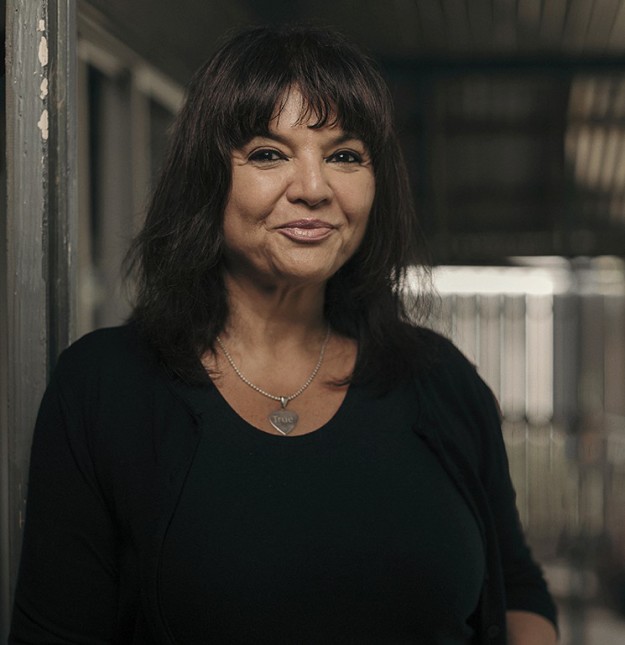Houston Press : Women are Dominating Houston Music, Both Onstage and Behind the Scenes
 Trish Herrera, guitarist in MyDolls since 1978, is a local legend. She and her bandmates have been an integral piece of the Houston punk community since it was dominated by testosterone-heavy groups like The Hates, D.R.I. and Really Red, to name a few.
Trish Herrera, guitarist in MyDolls since 1978, is a local legend. She and her bandmates have been an integral piece of the Houston punk community since it was dominated by testosterone-heavy groups like The Hates, D.R.I. and Really Red, to name a few.

With that reputation comes some impressive recognition. On July 28, the Contemporary Arts Museum Houston will host a discussion panel and performance by the band to mark the opening of “A World of Their Own: MyDolls Music and the Houston Punk Scene,” an exhibit that will feature several items from the band’s personal archives. Pretty big acknowledgment for a punk group.
Yet Herrera’s calm and sensitive demeanor would never make you think for a second that status has gone to her head. Whether performing for a standing-room-only crowd or working in the hair salon she runs out of her house, Herrera maintains the same cool, laid-back vibe.
Here, Herrera leans over the head of a client, clipping away while standing under a framed picture of Joan Jett. At 62, Herrera still plays a mean punk-rock guitar, with a beauty that defies whatever one might think women in their sixties should look like or should be doing. On this day, her fingers separate hair into sections as she speaks softly, yet firm in her convictions and opinions.
Herrera admits music has been a part of her identity her entire life. “I knew I was a musician from the time I was a small child,” she says. “I wanted to write songs and play guitar.”
When Herrera and MyDolls entered the punk scene, it was still very much a boys’ club. Riot Grrrl wouldn’t come into existence for nearly 20 years, often leaving her band to tough things out for themselves in an environment that wasn’t always so friendly.
“When slam-dancing started to become thrashing, with spikes and throwing each other around in the audience, the women that were once playfully slam-dancing in the front started getting hurt,” Herrera recalls. “They pushed us to the outskirts of the mosh pit. It became more like a boys’ club with a certain type of dress. More like boys playing football than expressing themselves politically or artistically.”
That “boys will be boys” attitude prevailed even in a scene that otherwise championed the values of self-expression and equality, remembers Herrera, recounting how she and her band were once treated.
“One club would not give us the money [after a show] because we were female,” she recalls. “[He] would only hand it to the male members of our entourage.”
“Never settle!” she urges. “Always get paid for your work — you’re worth it. Make sure that the clubs have great PAs and incredible sound engineers. Stay close and connected to your audience. Observe and communicate with people younger than yourself.
“Learn your craft; study the history of female musicians that have blazed the path for you,” Herrera continues. “Don’t strive to be famous; strive to do what you love. Be calm, listen, take your time and kick ass.”
Is it really important to recognize the gender of some of the city’s most prominent music-makers? Most of the women we spoke with said yes, women have unique perspectives that inform the music they make. Others said good music is good music, no matter the sex of its writer and/or performer. But one thing they all believe is that every woman in the scene, established or upstart, needs encouragement. They didn’t hesitate to impart what they’ve learned to benefit others.
“There are always going to be people out there who will ridicule you, try to snuff out the flame — don’t let them,” says veteran rocker Alice Sin, nee Allison Gibson, who currently sings for Supergrave and Baron Von Bomblast. “Follow your passions, follow your own dreams and visions because trust me, if you don’t get the fire burning, no one else is going to do it for you. Life is way too short to let yourself down.
“That being said, I really have to give a lot of credit to the Houston music scene,” she continues. “People like to pooh-pooh on it and talk shit, but I’ll tell you what, I’ve been on stages in this city for damn near close to 25 years and the support that I have been given, and continue to receive, floors me.”
“At this time, there is a spirit of cooperation, regardless of sex, in the Houston music scene,” agrees singer-songwriter Sherita Perez, who sees this as the natural progression of a larger societal shift from the 1960s and ’70s to today.
“This has resulted in ever-increasing numbers of children seeing their parents share the earning as well as domestic duties,” says Perez, who will release an EP this fall. “With so many of us growing up in this rebalanced way, it’s only natural that we would consider it the norm for women and men to work alongside one another. I know so many wonderful men that treat me with dignity and respect and appreciate me as an equal and valued contributor to the group and to the H-town music scene.”
But even such noble aspirations come with no guarantees. The only way to be treated with dignity and respect is to go out and command it, offers Oceans of Slumber’s Cammie Gilbert.
“Practice first, everything else second,” she says. “Don’t ask for permission or let anyone tell you what you should want for yourself. Seriously, they can kiss your ass. You want it, you go after it and you take it. Nothing is stopping you but yourself.”






Leave us a comment